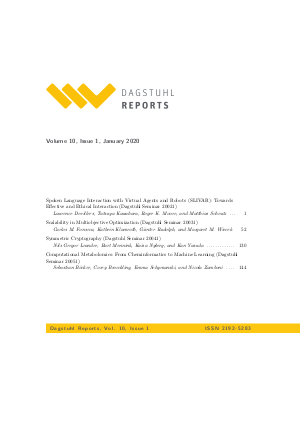Dagstuhl Reports, Volume 10, Issue 1
-
Part of:
Volume:
Dagstuhl Reports, Volume 10
Journal: Dagstuhl Reports (DagRep)

Event
- Dagstuhl Seminars 20021, 20031, 20041, 20051
Publication Details
- published at: 2020-06-26
- Publisher: Schloss Dagstuhl – Leibniz-Zentrum für Informatik
- DBLP: db/journals/dagstuhl-reports/dagstuhl-reports10
Access Numbers
- Detailed Access Statistics available here
-
Total Document Accesses (updated on a weekly basis):
0PDF Downloads
Documents
Dagstuhl Reports, Volume 10, Issue 1, January 2020, Complete Issue
Abstract
Cite as
Dagstuhl Reports, Volume 10, Issue 1, pp. 1-161, Schloss Dagstuhl – Leibniz-Zentrum für Informatik (2020)
Copy BibTex To Clipboard
@Article{DagRep.10.1,
title = {{Dagstuhl Reports, Volume 10, Issue 1, January 2020, Complete Issue}},
pages = {1--161},
journal = {Dagstuhl Reports},
ISSN = {2192-5283},
year = {2020},
volume = {10},
number = {1},
publisher = {Schloss Dagstuhl -- Leibniz-Zentrum f{\"u}r Informatik},
address = {Dagstuhl, Germany},
URL = {https://drops.dagstuhl.de/entities/document/10.4230/DagRep.10.1},
URN = {urn:nbn:de:0030-drops-123983},
doi = {10.4230/DagRep.10.1},
annote = {Keywords: Dagstuhl Reports, Volume 10, Issue 1, January 2020, Complete Issue}
}
Dagstuhl Reports, Table of Contents, Volume 10, Issue 1, 2020
Abstract
Cite as
Dagstuhl Reports, Volume 10, Issue 1, pp. i-ii, Schloss Dagstuhl – Leibniz-Zentrum für Informatik (2020)
Copy BibTex To Clipboard
@Article{DagRep.10.1.i,
title = {{Dagstuhl Reports, Table of Contents, Volume 10, Issue 1, 2020}},
pages = {i--ii},
journal = {Dagstuhl Reports},
ISSN = {2192-5283},
year = {2020},
volume = {10},
number = {1},
publisher = {Schloss Dagstuhl -- Leibniz-Zentrum f{\"u}r Informatik},
address = {Dagstuhl, Germany},
URL = {https://drops.dagstuhl.de/entities/document/10.4230/DagRep.10.1.i},
URN = {urn:nbn:de:0030-drops-123999},
doi = {10.4230/DagRep.10.1.i},
annote = {Keywords: Table of Contents, Frontmatter}
}
Spoken Language Interaction with Virtual Agents and Robots (SLIVAR): Towards Effective and Ethical Interaction (Dagstuhl Seminar 20021)
Abstract
Cite as
Laurence Devillers, Tatsuya Kawahara, Roger K. Moore, and Matthias Scheutz. Spoken Language Interaction with Virtual Agents and Robots (SLIVAR): Towards Effective and Ethical Interaction (Dagstuhl Seminar 20021). In Dagstuhl Reports, Volume 10, Issue 1, pp. 1-51, Schloss Dagstuhl – Leibniz-Zentrum für Informatik (2020)
Copy BibTex To Clipboard
@Article{devillers_et_al:DagRep.10.1.1,
author = {Devillers, Laurence and Kawahara, Tatsuya and Moore, Roger K. and Scheutz, Matthias},
title = {{Spoken Language Interaction with Virtual Agents and Robots (SLIVAR): Towards Effective and Ethical Interaction (Dagstuhl Seminar 20021)}},
pages = {1--51},
journal = {Dagstuhl Reports},
ISSN = {2192-5283},
year = {2020},
volume = {10},
number = {1},
editor = {Devillers, Laurence and Kawahara, Tatsuya and Moore, Roger K. and Scheutz, Matthias},
publisher = {Schloss Dagstuhl -- Leibniz-Zentrum f{\"u}r Informatik},
address = {Dagstuhl, Germany},
URL = {https://drops.dagstuhl.de/entities/document/10.4230/DagRep.10.1.1},
URN = {urn:nbn:de:0030-drops-124009},
doi = {10.4230/DagRep.10.1.1},
annote = {Keywords: human-robot interaction, spoken language processing, virtual agents}
}
Scalability in Multiobjective Optimization (Dagstuhl Seminar 20031)
Abstract
Cite as
Carlos M. Fonseca, Kathrin Klamroth, Günter Rudolph, and Margaret M. Wiecek. Scalability in Multiobjective Optimization (Dagstuhl Seminar 20031). In Dagstuhl Reports, Volume 10, Issue 1, pp. 52-129, Schloss Dagstuhl – Leibniz-Zentrum für Informatik (2020)
Copy BibTex To Clipboard
@Article{fonseca_et_al:DagRep.10.1.52,
author = {Fonseca, Carlos M. and Klamroth, Kathrin and Rudolph, G\"{u}nter and Wiecek, Margaret M.},
title = {{Scalability in Multiobjective Optimization (Dagstuhl Seminar 20031)}},
pages = {52--129},
journal = {Dagstuhl Reports},
ISSN = {2192-5283},
year = {2020},
volume = {10},
number = {1},
editor = {Fonseca, Carlos M. and Klamroth, Kathrin and Rudolph, G\"{u}nter and Wiecek, Margaret M.},
publisher = {Schloss Dagstuhl -- Leibniz-Zentrum f{\"u}r Informatik},
address = {Dagstuhl, Germany},
URL = {https://drops.dagstuhl.de/entities/document/10.4230/DagRep.10.1.52},
URN = {urn:nbn:de:0030-drops-124017},
doi = {10.4230/DagRep.10.1.52},
annote = {Keywords: multiple criteria decision making, evolutionary multiobjective optimization, scalability}
}
Symmetric Cryptography (Dagstuhl Seminar 20041)
Abstract
Cite as
Nils Gregor Leander, Bart Mennink, Kaisa Nyberg, and Kan Yasuda. Symmetric Cryptography (Dagstuhl Seminar 20041). In Dagstuhl Reports, Volume 10, Issue 1, pp. 130-143, Schloss Dagstuhl – Leibniz-Zentrum für Informatik (2020)
Copy BibTex To Clipboard
@Article{leander_et_al:DagRep.10.1.130,
author = {Leander, Nils Gregor and Mennink, Bart and Nyberg, Kaisa and Yasuda, Kan},
title = {{Symmetric Cryptography (Dagstuhl Seminar 20041)}},
pages = {130--143},
journal = {Dagstuhl Reports},
ISSN = {2192-5283},
year = {2020},
volume = {10},
number = {1},
editor = {Leander, Nils Gregor and Mennink, Bart and Nyberg, Kaisa and Yasuda, Kan},
publisher = {Schloss Dagstuhl -- Leibniz-Zentrum f{\"u}r Informatik},
address = {Dagstuhl, Germany},
URL = {https://drops.dagstuhl.de/entities/document/10.4230/DagRep.10.1.130},
URN = {urn:nbn:de:0030-drops-124023},
doi = {10.4230/DagRep.10.1.130},
annote = {Keywords: (quantum) cryptanalysis, constrained platforms, symmetric cryptography}
}
Computational Metabolomics: From Cheminformatics to Machine Learning (Dagstuhl Seminar 20051)
Abstract
Cite as
Sebastian Böcker, Corey Broeckling, Emma Schymanski, and Nicola Zamboni. Computational Metabolomics: From Cheminformatics to Machine Learning (Dagstuhl Seminar 20051). In Dagstuhl Reports, Volume 10, Issue 1, pp. 144-159, Schloss Dagstuhl – Leibniz-Zentrum für Informatik (2020)
Copy BibTex To Clipboard
@Article{bocker_et_al:DagRep.10.1.144,
author = {B\"{o}cker, Sebastian and Broeckling, Corey and Schymanski, Emma and Zamboni, Nicola},
title = {{Computational Metabolomics: From Cheminformatics to Machine Learning (Dagstuhl Seminar 20051)}},
pages = {144--159},
journal = {Dagstuhl Reports},
ISSN = {2192-5283},
year = {2020},
volume = {10},
number = {1},
editor = {B\"{o}cker, Sebastian and Broeckling, Corey and Schymanski, Emma and Zamboni, Nicola},
publisher = {Schloss Dagstuhl -- Leibniz-Zentrum f{\"u}r Informatik},
address = {Dagstuhl, Germany},
URL = {https://drops.dagstuhl.de/entities/document/10.4230/DagRep.10.1.144},
URN = {urn:nbn:de:0030-drops-124036},
doi = {10.4230/DagRep.10.1.144},
annote = {Keywords: bioinformatics, chemoinformatics, computational mass spectrometry, computational metabolomics, machine learning}
}